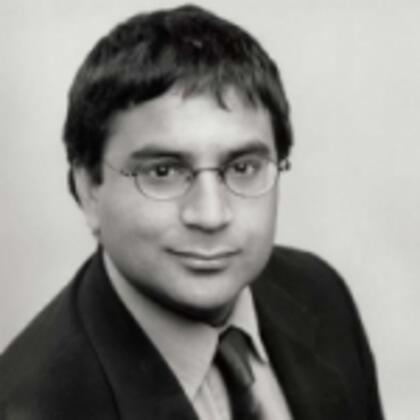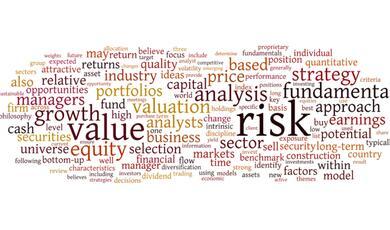Maths, risk and careers in the City
Share
- Details
- Text
- Audio
- Downloads
- Extra Reading
This lecture gives an insight into how the mathematics we learn at school and college is applied in a practical way in careers, especially in the world of finance, and looked at some of the opportunities open to mathematics students.
Download Text
MATHS, RISK AND CAREERS IN THE CITY
Professor Avinash Persaud
One of the things we’re very lucky to have at Gresham is a long tradition and association with some of Britain ’s most famous mathematicians. Sir Christopher Wren and his contemporary, Robert Hooke, were both Professors here at Gresham College and we’re very fortunate this year to have Robin Wilson, who is a visiting professor of mathematics.
My own subject is economics. I studied economics at the London School of Economics in the late 1980’s and economics, like many social sciences, was not considered to be a proper science and so economics has become very mathematical. Indeed, when I was studying for my Master’s, I sometimes thought I was in the wrong class because it seemed like engineering rather than economics - lots of maths. It could be called hydrology because in economics there are lots of flows and systems like the study of water flows, which is hydrology.
Generally I would say, we are living in an age today where quantitative analysis is seen as very important, increasingly important. It’s almost a sort of gargantuan New Age wave - a number of subjects try to emphasise the quantitative nature.
I want to touch on a little bit on the way in which we use science and maths in the sense of power. I will leave you with 2 or 3 messages, and one is that knowledge, of course, is power and one of the reasons why the study of mathematics is very important, irrespective of whether you end up in a maths related career, is you need to be able to understand mathematicians. If there’s a whole part of life that you cannot understand, even if you’re not involved in it everyday because you are not interested in maths, then you suffer from that. You suffer from the inability to share in that knowledge, to understand that knowledge and not to appreciate when people perhaps are abusing that knowledge. And so, the study of maths is very important not only directly for a career in a mathematically related subject but simply in the way you participate in society in the future and understand what’s going on.
Even in today’s world, we tend to use science and maths as a measure of our superiority. Maths and science is almost a weapon of superiority. Today we assume moral superiority by saying we are a much more modern, quantitative, scientific age of civilisation than in the past. We say we are morally superior, perhaps, because we can now use the latest technologies and mathematics and sciences to pinpoint exactly where our bombs go today, which we couldn’t do in the past.
In the battle of the sexes, men like to say that they are a much more rational part of our race, more mathematical, more quantitative, more logical, as a way of asserting their power. I have been in the study of finance and we have a paltry, a very sadly low proportion of women, probably because of the culture that finance and trading have in the City. Risk management is all about mathematics and this somehow is a male preserve.
So, I was very pleased to read a very recent piece of research which showed that, having studied investors who were both male and female, the study showed that women are far better investors then men. The reason why is because they are much less irrational then men and most fellow investors who are men tend to get easily caught up by the latest fads and fashions, like the dot com bubble, etc.
So, knowledge is power. It’s very important to you to be able to understand and appreciate maths and science to participate fully in today’s society and to make sure that people don’t abuse their knowledge if you don’t have it.
I want to talk to you a little bit about my own career in the City and hope that that helps to illustrate what kind of careers may be open to someone with a mathematical bent in the City. I wanted to also describe a little bit about what the City does, what is finance. Certainly when I was leaving University, I had very little understanding of finance. I learned all my finance, in fact, on the job, not in the classroom. So I’ll touch a little bit on finance in the City, and then I’d like to touch a little bit at the end about different jobs that are available to mathematicians outside of the City and in finance that we come across as financiers.
I remember when I first started off as a City economist, an analyst, presenting to clients, we’d often have a meeting that would last an hour. The client would say ‘come in and speak to us for one hour’ and we would design a presentation that would last about 59 minutes in the hope that they would have no time to ask us difficult questions. I’m beginning to realise that that’s actually a very silly thing to do because you only learn by people asking questions, that there is no learning going on by people just speaking to you, and, indeed, the best presenter is someone who is a good listener. So what I want to do is talk a little bit, for maybe 30 minutes or so, and I’d like you to ask some questions. I don’t know how often you have the opportunity to speak to someone about careers in the City - please make sure you take advantage of it.
I went to school in Northwest London . I think some of you are from NLCS, is that correct? My sister was a student of North London Collegiate School ; I know it well, many a time picking her up from school. Back then, I was in fact the only Asian face in the school and I was convinced, until I went to University, that I was a north London Jewish boy because all my friends were, and it was only when ‘JSoc’ refused to have me at the LSE that I realised I was actually an Asian person! I studied Economics at LSE, and back then it was very quantitative. I went to LSE because they gave you a big, fat book with all the options you could study at the London School of Economics, and it had wonderful subjects like social psychology, and I thought, fascinating subject, I’d like to study that, and they said to me, well, if you want to be an economist, you’ve got to study 4 courses - you must do one in macroeconomics, the economics of the whole economy, and you must do micro economics, the economics of individual firms, and we’re very mathematical today so you have to do a maths option and you must do a stats option, so I had no freedom with any of those. That thick book was a waste of time for me. I had to do these very quantitative subjects.
When I left the London School of Economics, I had no idea about what career I wanted to do. It’s very hard to know. We had ‘milk rounds’, the big companies would come to universities and present what they do. It was very confusing. They use names interchangeably that I had no idea of. Some banks called Corporate Finance ‘Investment Banking’ and some banks called Investment Banking ‘Fund Management’ and these were just words - I had no idea what they were.
We tended to go to those banks that offered the best dinner because you’re a student, you don’t have much money, I was thinner than I am today, and the best dinner was very interesting. So, I ended up going along to milk rounds and ended up in a job by accident – I had no idea what it was. It was at a company called Phillips and Drew. Back then, I was very active in the Anti- Apartheid movement and we were campaigning against companies like the Union Bank of Switzerland, who were heavily invested in South Africa, and I joined Phillips and Drew and found out a month later that UBS, Union Bank of Switzerland, had taken over Phillips and Drew. I had no idea about what was going on, you never do as a young student. I became a Gilts economist. Gilts are government fixed interest bond type instruments. They’re called Gilts because initially it was on a piece of paper which was gilt edged. The market is called the Gilt Edged Market. So when the government wants to borrow money, it issues a piece of paper promising to repay whoever got the money from in 10 years, 20 years or 30 years and to pay them an annual rate of interest – in fact it’s often biannual, twice a year.
I was a Gilts economist, and we became what was quaintly called GEMMS, Gilt Edged Market Makers. There were only about 12 Gilt Edge Market Makers, so it was a very cosy market in those days. This was before what was called ‘The Big Bang’ when the market was opened up to competition from abroad. There were about 8 or 10 different British institutions, and we used to sit there very cosily chatting to the Bank of England.
And then they announced, after UBS took over Philips and Drew, that I was no longer going to be a Gilts economist, I was going to be a Currency economist. I had no idea what that was, and I thought this was really annoying because Gilt research was really very easy. All I had to do was listen to Radio 4 in the mornings, they’d tell you what was going on, politics and economics, and I would basically tell the traders at my bank what I heard on Radio 4. They never listened to Radio 4 so it was okay – they thought I was doing some very interesting pieces of research.
Being a Currency economist was terrible because they didn’t have currencies on Radio 4, so I was kicking and screaming, but it was the best thing for me because the currency market is an international market. It’s the very largest market in the world. 1.5 trillion dollars, that’s 1.5 thousand, thousand, thousand dollars are traded every day on this currency market, much bigger than a gilt edged market, and much more interesting issues. Every issue affects currency.
Then I moved from the Union Bank of Switzerland to a company called JP Morgan. Banks are rated according to their credit so AAA is the highest.
This was a Swiss bank, Swiss conservative institution, lots of money, very credit-worthy bank, and we used to get lots of business just because we were viewed as a good quality bank. The City has very crude jokes; we used to call it Chernobyl business, because it just fell out of the telephone like nuclear fallout. People would call up; business just fell out of the telephone. I was convinced I had to work for a Triple A Bank, that I was going to leave UBS one day, but it had to be to a Triple A Bank. I didn’t realise at the time there was only about 2 other Triple A Banks in the world, and one of them, JP Morgan, called me up and I went to work for JP Morgan as a Currency economist. JP Morgan had the largest research departments in the City. The City is one of the largest employers of students of quantitative degrees, not just economics, science, mathematics. I worked with physicists, with chemists, the head of research was a chemist, my colleague was a physicist, lots of economists, lots of people doing finance.
I learnt things. You’re going to ignore the lessons I’m going to tell you I’ve learnt, because in my experience of employing people and working with people, they always ignore the lessons of older people and they say ‘well, that’s just some old fogie’. You’ll have to learn the lesson yourself, but if you’re in a short frame of time, the lessons I learnt were (1), change is good, because you never know what other people are doing. You always think you know what’s going on in your own little space and you don’t know what’s going on in the rest of the world. I’ve moved jobs every 5 years, That was initially by accident and now it’s become by deliberation, very deliberate, because change is good. Every time, as a typical quantitative person, I’ve written out my list of reasons why I should change my job and the reasons why I should stay, and I would change. None of the reasons was right, and yet change proved to be a good thing. So, change itself is good. You learn new things. People think you are brilliant when you come with a suggestion of how they can do something differently, and you’re not – it’s just because you remember that’s how they did it at the last job you were at. But, change is good.
The other thing I’ve learnt which people seldom do is to embrace failure. Failure is fantastic. You learn a lot from failure. Chairman Mao, in fact, said that ‘failure is the root to success’. People learn nothing from their successes, everything from their failures. And what you should do with a failure is thank God you’ve failed, recognise it. Most people hate to recognise failure. They think, oh my Lord, it wasn’t a failure and they find some excuses for it, but failure is fantastic because it gives you an opportunity to sit and think ‘why did that not work out? Why did that forecast of the Direct Exchange Rate not succeed? What did I do wrong?’ And so, whenever you make mistakes in your life, think about them carefully, what went wrong, how do I make sure it doesn’t happen again? People who are successful, they think they are successful because they are brilliant; they don’t think they are successful because they did something to make them successful. Once you have a failure, you start to focus on that. So I think those are two very important lessons.
Let me talk to you a little about what happens in the City. Banking is an information business. Banking exists because in the world you have people who have money and there are people who have great ideas and often they’re not the same people. How do people with great ideas get access to people with money to invest in those ideas? They don’t know them, they don’t bump into them. They don’t know if a person says they’ve got money, do they really have money? What is their credit quality? What is their ability to finance your project? So banks exist; we call it intermediation, they sit in the middle, they have all the people with cash and all the people with good investment ideas, and they try and bring the two together, and that really is what banking is about. Banking is an information business.
It’s why banking has been the business most heavily affected by information technology. What’s been the biggest impact on your High Street? The disappearance of banks. Information technology, the collapse of information costs, has made banking much easier. We can find out an awful lot about people who have got money and people who have got ideas now. We don’t need to go to a bank to do that. And so information is very important to finance. That’s one of the first things to learn about finance.
Let me give you an example of a typical financial transaction. One I’m involved in at the moment, in fact, and you’ll see hopefully through it how a career in maths can help you.
The price of oil has been rising very strongly, which is great if you are an oil producer, like in the Middle East or Venezuela or Trinidad and Tobago or Nigeria or Malaysia ; not very good if you are an oil importer. The UK used to be a major oil exporter from the North Sea . Now we are net oil importers for the first time in about 20 years. If you’re importing oil, and you don’t have it and the cost is going up very sharply, it’s a real problem
How do bankers get involved? Well, volatility in prices is a problem. It is a problem for everyone. Even if you are an oil producer, you’re having a good time today, but some 5 years ago you were having a hell of a time because the oil price was very low. No one likes volatility, neither the producer nor the importer of oil. And so, we have devised an instrument where the oil producer says to an oil importer ‘I will guarantee you the price of oil. There’s a market for oil. It goes up and down every day, but you need oil for the next 10 years and I will give you oil for the next 10 years at one price. You may not like the price in the beginning, but at least you know it’s certain. You have no risk, no uncertainty, and risk and uncertainty are worth something’.
In a manufacturing business today, manufacturing businesses have a 4% profit margin on average; so, they sell things for about 4% more than it costs them to buy them, or produce them. The price of oil has doubled in the past couple of years. Your profit margin can be wiped out by volatility in prices, and so, certainty is very useful to you. But how do you work out what is the right price over 10 years? What is the price that treats fairly the producer of oil and the importer of oil? It is failure to agree on that 10 year price of oil which means that most people suffer the exposure to vulnerability in the volatility of oil prices.
And so, we use mathematical analysis to try and predict the price of oil over the next 10 years, and that is the function of looking at the supply and demand of oil. We look at who demands a lot of oil. The Chinese economy and the US economy, they’re the biggest consumers of oil today. How rapidly are they going to grow over the next 10 years? What is going to drive their economic growth? There is a huge immigration, migration of workers from the countryside to the towns in China as part of their economic activity. We have to estimate the growth rate of China and the US over 10 years. We estimate how much oil they will use in that growth because technology changes the utilisation of oil. Our cars today use less oil than they used to. They’re more efficient, the engines are more efficient. So we need quantitative analysis to understand how the demand for oil will change.
Then there is the supply of oil. One of the interesting things about finance as opposed to a lot of engineering is that our numbers are very unstable. So, as the price of oil increases because there is more demand, over time that higher price of oil will create more supply. The price of oil goes up – people think, oh, oil is really quite an attractive thing to invest in; I’ll start spending money on trying to find more oil. The increase in the price of oil actually creates the supply of oil, and we have to estimate that dynamic process.
So we employ a number of people to try and come up with a 10 year average price of oil that is seen to be fair for the producer and the importer of oil. And then we have to think about creating a financial instrument that allows them to trade in this 10 year average price oil. If they’re in this contract for 10 years, what happens if in 5 years’ time their circumstances change? They’re a fairly big oil importer and suddenly they discover oil themselves. India used to be a huge oil importer. In the past 12 months they have made many major discoveries in the Rajasthan Desert . Their import bill has changed. So, you need to have instruments that can be traded and moved around over time, and we employ quantitative analysts, mathematicians to devise those instruments.
When we work in finance, we also come across many other professions that use mathematicians. One of the things we are doing at the moment is financing a nitrogen fertiliser plant in Trinidad and Tobago . Nitrogen fertiliser comes from gas. Well, we don’t really understand the science, being lowly economists, but in financing this big industrial plant, it’s very clear to us the importance of the engineers who have to design this plant, who have to make sure, because the plant is built in 20 different locations, that when, having built this plant in 20 different locations and then bring it together, it actually fits together. You can imagine if you’re building something in 20 different parts how easily it would be that the parts don’t fit together.
And then, we have to stress test this plant. We think this is what the plant will produce, a fertiliser, over the next 10 years under certain conditions. But, what happens if the pressure of gas changes? What happens if gas prices change and we want to use different things to feed this plant? There are many different things, calculations involved in trying to make sure that this plant, once built, will function, and we require the quantitative analysis for that.
As an economist, we look upon the engineers and say well your life is easy because at least these things are quite stable. You don’t have a lot of what’s called the Heisenberg Principle of Uncertainty, which is very prevalent in finance. Heisenberg basically said that the act of observing something can change it and that’s really very important if you’re trying to analyse something. So, the act of putting it under a microscope and heating it up to look at it, might changes its behaviour. We think we understand what we’re seeing under the microscope, but it may change what it is because we are looking at it through the microscope. In finance, this is very, very prevalent.
I’d like to tell you a story of how maths can actually be a path to disaster in finance if inappropriately used. Maths is a tool, it is not the solution. Maths is not an excuse for not using your brain, it is simply a tool. So, the cult of quant has taken over finance. It’s made lots of good careers for mathematicians, but sometimes the desire to have a number makes us lazy, and makes us not think about something properly. In finance, mathematicians have been used to try and estimate good investments, and we use a very simple financial idea that a good investment is the one that, over the long run, gives you a high return; you get a lot back for the amount of money you put in, and this return is not risky. I can always get a high return if I have lots of risk, and the measure of risk is how volatile my return is. Is it 20% this year, 2% next year, 30% the next year and -10 % the year after? Well, on average that is quite a high number, but it’s very volatile. And then, I want a return that is uncorrelated. Correlation is very important in finance. What that means is I don’t want to invest all my eggs in one basket. One of the problems people had recently in the Enron saga is that the people who worked for Enron had their life savings invested in Enron shares. Now that’s a correlated risk. If the company goes down, I lose my job, I lose my income and I lose my savings. Good investment is about uncorrelated risks. Enron is in the energy sector. If you’re employed when the energy sector does well, a good hedge in finance is to have your life savings invested in something unrelated to energy, or perhaps inversely related to energy. When energy prices go down, your investments goes up. That’s the kind of hedge you want to have.
The mathematicians in 1996 did their study of all the markets in the world, and they found one market that was the best. It gave them great long run returns, very high returns, and these returns were not very volatile, they were very stable, and, they were quite uncorrelated with other things. So, mathematicians came to the investors and said ‘this is where you’ve got to invest your money’ - high returns, low volatility, low correlation - and the place was Asian Equities. The investors invested a large portion of their money in this one area, but the act of everyone investing their money in this area changed the behaviour of Asian Equities. The act of the herd investing in Asian Equities meant those equities became overvalued; they no longer gave you a good return. Because everyone had the same investment, they were no longer uncorrelated. And, when they started to go down and everyone tried to panic and get out at the same time, they became very volatile.
So, the act of observing that was a safe area made it risky, and that is an example of where math is a tool but it’s not the solution. We have to go beyond the analysis of ‘that’s what a safe area was in the past’ to thinking, well how would the observation of that change its behaviour. And one of the reasons is quite interesting. In the early days the social sciences used to be feeling a little bit like the ugly sister, the impoverished brother, they weren’t quite quantitative enough. Now we’re realising that although the quantitative analysis exists, it’s even more complex than in some of the purer sciences because there’s far greater interdependence. The behaviour of people can be modelled. The reason why we didn’t do it in the past is because the modelling is a little more complex than the tools that we had. In economics, we have moved from thinking about science and being very pure in our quantitative analysis towards what we call behavioural finance, the understanding of human behaviour, and the models that we use to understand that are 10 times more complex than the models we used to use before. They are not linear, humanity is not linear, and that adds a great degree of complexity.
© Avinash Persaud, Gresham College , 11 November 2004
This event was on Thu, 11 Nov 2004
Support Gresham
Gresham College has offered an outstanding education to the public free of charge for over 400 years. Today, Gresham College plays an important role in fostering a love of learning and a greater understanding of ourselves and the world around us. Your donation will help to widen our reach and to broaden our audience, allowing more people to benefit from a high-quality education from some of the brightest minds.


 Login
Login







